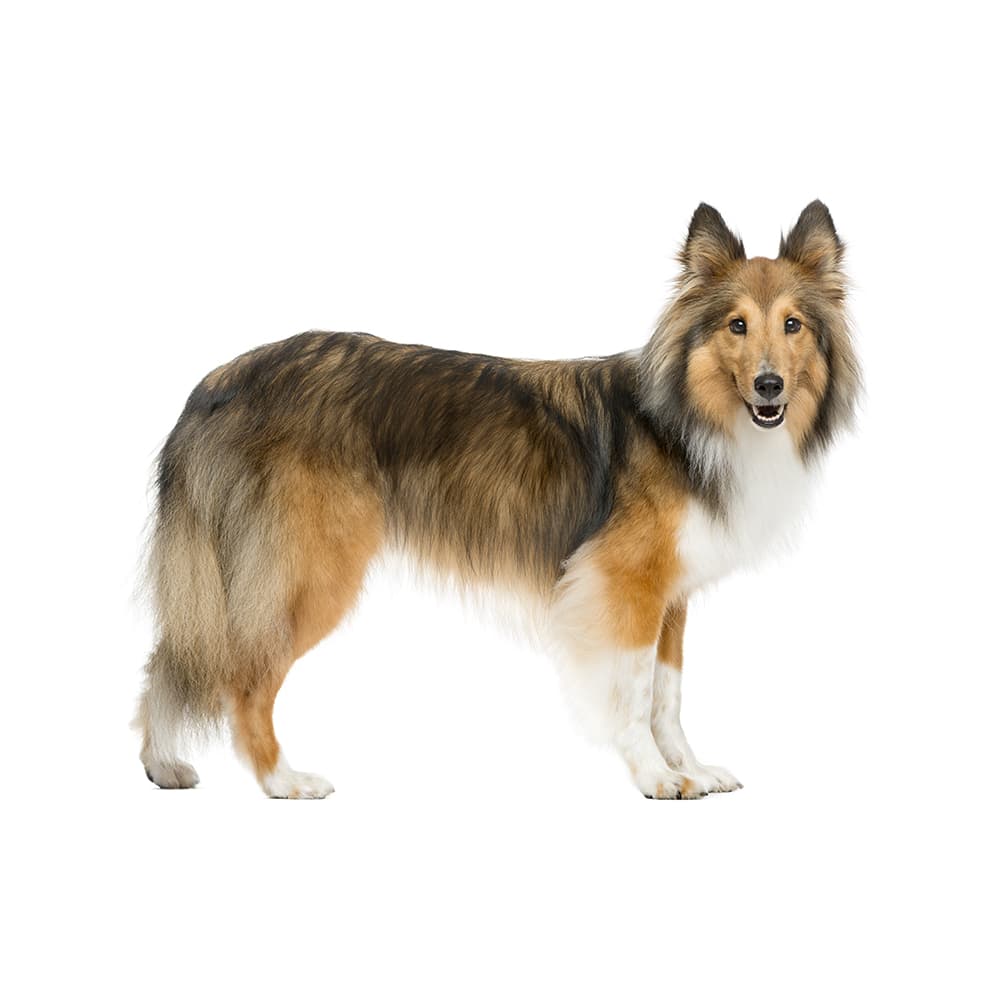Discover your dog's connection to this breed and 200+ others


Discover your dog's connection to this breed and 200+ others



The Shetland Sheepdog, often known as the Sheltie, is a breed of herding dog. They're small to medium-sized and bear a strong resemblance to the Rough Collie. This breed is known for its intelligence, agility, and amicable personality, which makes it popular among families and dog enthusiasts. The Shetland Sheepdog originates from the Shetland Islands in Scotland, where the hardy environment and sparse resources shaped a breed that was small, agile, and highly intelligent. Initially, the dogs were employed to herd and guard the small sheep flocks of the islands, where their size allowed for a minimum consumption of the scarce resources available. The breed as we know it today was refined in the early 20th century and was recognized by The Kennel Club (UK) in 1909.
Shetland Sheepdogs can suffer from dermatomyositis, Collie eye anomaly, multidrug resistance 1, patellar luxation, allergies, hemophilia, progressive retinal atrophy, von Willebrand Disease, epilepsy, hypothyroidism, hip dysplasia, Legg-Calve-Perthes disease (LCPD), trichiasis, degenerative myelopathy, patent ductus arteriosus, cataracts, and deafness. Some dogs may be intolerant of the drug ivermectin. Genetic testing can assist veterinarians with diagnosis and proactive care, as well as help breeders identify affected and carrier dogs. It is also important to note that two homozygous merle individuals should not be mated, as it will result in health complications and/or death.
Shelties are known for their intelligence, agility, and capacity to understand and respond to their owners. They're very trainable, often excel in obedience, agility, and herding trials, and are keenly observant and responsive. Shelties are often reserved towards strangers but should not be shy or show any signs of aggression. They are good with children if they are raised with them from puppyhood and are known for their loyalty and affection towards their families.
Shelties have a thick double coat with a long, straight, harsh topcoat and a short, dense undercoat. They're known for their manes and frills. The coat is more profuse in males than in females. They're heavy shedders and require regular grooming.
A canine genetic lineage is a group of individuals or entire breeds that descended from common ancestors predating modern breed formation. Often these lineages are associated with a ‘type’ of dog with a unique historical working role and associated behaviors (e.g., herding, scent hunting, etc.).
Herding dogs are known for their high intelligence, trainability, and strong work ethic. These breeds originated in areas where managing livestock was an important part of daily life and had large pastoral lands. These breeds were specifically developed to help farmers and shepherds move, manage, and protect herds of livestock. Breeds within the herding dog lineage are agile and are known to have a natural herding instinct, where they like to keep their animals together. They are loyal and attentive to their handlers and are eager to please and are also highly aware of their environment. Many breeds within this linage have gone on to work as rescue and police dogs.
Example breeds with ancestry from this lineage include Border Collie, Cardigan Welsh Corgi, and German Shepherd.
A canine genetic lineage is a group of individuals or entire breeds that descended from common ancestors predating modern breed formation. Often these lineages are associated with a ‘type’ of dog with a unique historical working role and associated behaviors (e.g., herding, scent hunting, etc.).
Herding dogs are known for their high intelligence, trainability, and strong work ethic. These breeds originated in areas where managing livestock was an important part of daily life and had large pastoral lands. These breeds were specifically developed to help farmers and shepherds move, manage, and protect herds of livestock. Breeds within the herding dog lineage are agile and are known to have a natural herding instinct, where they like to keep their animals together. They are loyal and attentive to their handlers and are eager to please and are also highly aware of their environment. Many breeds within this linage have gone on to work as rescue and police dogs.
Example breeds with ancestry from this lineage include Border Collie, Cardigan Welsh Corgi, and German Shepherd.
The Shetland Sheepdog is ranked as the 6th most intelligent dog breed out of 138 breeds tested, according to Stanley Coren's "The Intelligence of Dogs". They are considered to have "Excellent Working/Obeying Intelligence".
Despite their resemblance to Rough Collies, Shelties are not a miniature version of the breed. They were bred independently and have different characteristics and temperaments.
They're known for their "Sheltie spin," a whirl of excitement that Shelties often perform when they're happy or excited.
https://www.akc.org/dog-breeds/shetland-sheepdog/
https://www.petmd.com/dog/breeds/c_dg_shetland_sheepdog
https://www.pawprintgenetics.com/products/breeds/43/
https://www.ukcdogs.com/shetland-sheepdog
https://www.fci.be/en/nomenclature/SHETLAND-SHEEPDOG-88.html
Recommended by top vets with decades of experience
21 breeds
64 genetic health markers
50 genetic trait markers
